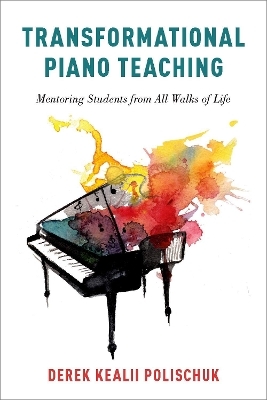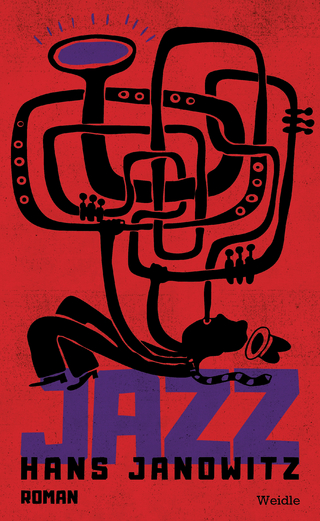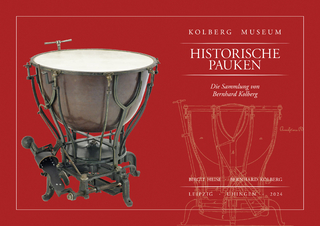
Transformational Piano Teaching
Oxford University Press Inc (Verlag)
978-0-19-066465-7 (ISBN)
interpersonal relationships to social media. Additionally, students from specific circumstances are discussed, including those with special needs such as Autism Spectrum Disorders, ADHD, and Depression. Finally,
motivation of a teacher's students is related to a teacher's own motivation in their work, as a cycle of positivity and achievement will be recommended as a way to keep an instructor's work fresh and exciting.
Derek Kealii Polischuk is Associate Professor of Piano and Director of Piano Pedagogy at the Michigan State University College of Music. An enthusiastic supporter of the education of musicians at every age, ability and background, Polischuk has been a featured presenter at the National Conference on Keyboard Pedagogy and the Music Teachers National Association Conference. Polischuk is the founder and artistic director of the Celebrating The Spectrum Piano Festival at Michigan State, which provides a summer music festival opportunity for pianists on the Autism Spectrum. Polischuk's critically acclaimed recordings of chamber music and music for solo piano appear on the Blue Griffin label.
1. The Piano Teacher as a Mentor: An Introduction
2. Teaching Gifted Students
-What Is Giftedness?
-Gifted Students In The Piano Studio
-Ability Grouping
-Establishing An Effective Learning Environment For Gifted Students
-Creating An Effective Emotional Environment For Gifted Students
-Supporting Gifted Females
3. Teaching Adult Pianists
-Motivation in Adult Pianists
-Challenges Faced By Adult Learners
-Strategies for Teaching Adult Pianists
-The Benefits of Piano Study for Adults
4. Meeting The Needs of the Recreational Student
-A History Of Recreational Music Making
-Recreational Music Making Research
5. Working With Pianists With Depression
-Recognizing Depression
-How Common Is Depression In Children
-Symptoms Of Childhood Depression
-Suicide
-What Causes Depression?
-Effective And Appropriate Teacher Interventions
6. Working With Pianists With High Functioning Autism
-Research In Autism Instruction
-Designing Teaching Strategies Based On Research
-Applied Behavior Analysis And Discrete Trial Training
-TEACCH Method
-Wings Mentor Program
-Scope and Sequence
7. Working With Pianists with Attention Deficit Hyperactivity Disorder
-Subcategories of ADHD
-Possible causes of ADHD
-Symptoms of ADHD
-Diagnosing ADHD in Children
-Diagnosing ADHD in Adults
-Treating ADHD
-The Role of Parents and Teachers in the Treatment of ADHD
-Helping a Child With ADHD Thrive At Home
-Teaching Students With Attention Deficit Hyperactivity Disorder
-Making Expectations Concise and Clear
8. Teaching Undergraduate Pianists
-The Art of Teaching Undergraduates
-Strategies For Undergraduate Lectures
-Helping Undergraduates Develop Critical Thinking Skills
-Opportunities For Active Learning
-Models of Evaluation
-Modeling Enthusiasm For Academia
-Maintaining a Safe And Professional Relationship
-Learner Self-Responsibility
9. Mentoring Graduate Student Pianists
-A Brief History Of Graduate Education
-The Role Of Mentor
-The Benefits Of Mentoring Graduate Students
-The Responsibilities Of The Mentor
-Best Practices For Mentors
-Establishing A Mentoring Relationship
-A Relationship That Is Both Professional And Personal
-Mentoring Graduate Students In A Diverse Academy
10. Working With International Student Pianists
-Designing Instruction For International Students
-Academic Integrity And The International Student
11. What Can We Learn From Some Of History's Great Piano Teachers?
-Carl Philipp Emanuel Bach
-Wolfgang Amadeus Mozart
-Carl Czerny
-Franz Liszt
-Josef Lhevinne
-Rosina Lhevinne
-Adele Marcus
-Leon Fleisher
-Russell Sherman
-Great Teachers Balance Technique and Music
12. Bringing It All Together: Your Studio as a Diverse Set of Individuals
-Societal Diversity In The Piano Studio
-Diverse Piano Personalities
-The Diversity of Human Development
13. The Motivated And Inspired Piano Teacher
-Piano Teacher Training
-Continuing Education For Piano Teachers
| Erscheinungsdatum | 04.01.2019 |
|---|---|
| Verlagsort | New York |
| Sprache | englisch |
| Themenwelt | Kunst / Musik / Theater ► Musik ► Instrumentenkunde |
| ISBN-10 | 0-19-066465-7 / 0190664657 |
| ISBN-13 | 978-0-19-066465-7 / 9780190664657 |
| Zustand | Neuware |
| Haben Sie eine Frage zum Produkt? |
aus dem Bereich


